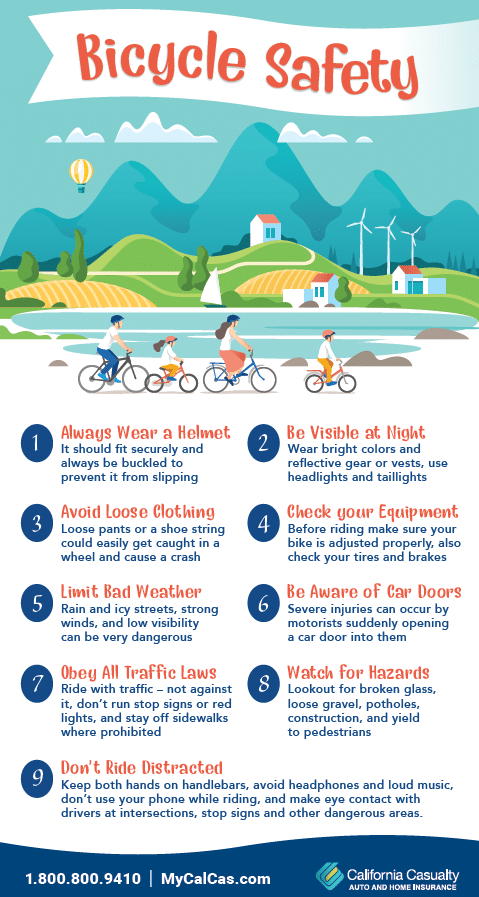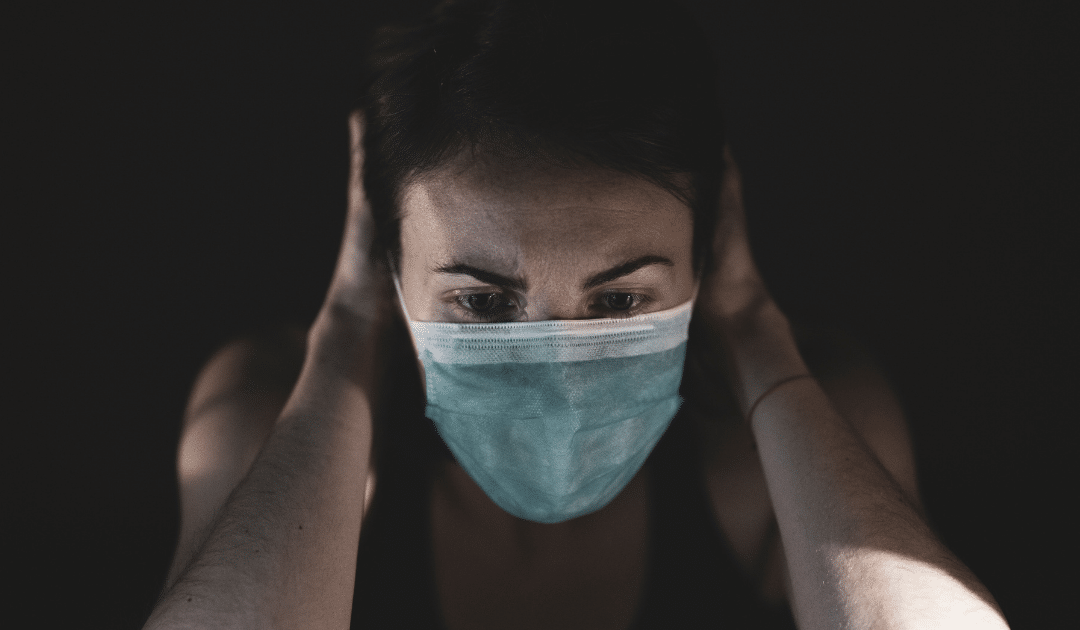
by California Casualty | Health, Safety |
Emergency preparedness will help you and your family stay safe in the event of a disaster. House fires, flash flooding, and natural disasters can happen anywhere at any time, and as we move into summer- hurricane and wildfire season, the risk for an emergency is even greater.
Coronavirus (COVID-19) has completely changed the way we interact with others- and will for the foreseeable future. That’s why it’s important to take action now to make sure you and your family are prepared for an emergency situation, while still taking the proper precautions to avoid COVID-19.
Here’s how to be prepared for an emergency during the middle of a pandemic.
Make a Preparedness Kit
Emergency Preparedness Kits are kits built for you and your family to have in the event of a disaster. These kits include all essential items that you would need to survive i.e. bottled water, toilet paper, copies of important documents, medication, food, chargers, hygiene items, etc.
The Red Cross recommends that during COVID-19, you should assemble two different emergency kits for you and your family.
Stay-At-Home Kit- This kit should include 2 weeks of emergency supplies. In the event that you or your family are exposed to the virus and you have to self-quarantine you should have everything that you would need to survive for 2 weeks without leaving your home.
Evacuation Kit- This kit should include 3 days of supplies in a “go bag”. It should hold all of your basic needs, yet be lightweight and easy to grab/carry in the event of an emergency evacuation. It is recommended that you have enough supplies for 72 hours. This also includes supplies for your health and safety in large crowds i.e. face masks, sanitizer, alcohol wipes, etc.
The Red Cross also recommends that each kit should have a 1 month supply of prescription medication along with fever-reducing medicine and cough suppressants.
Other Disaster Planning Tips
Making a disaster plan during a pandemic requires planning ahead, because of the need for social distancing. In the event of a natural disaster, sheltering in large buildings like school gyms and community centers may no longer be an option, and you will have to seek shelter elsewhere.
Here are some tips, the Red Cross recommends, to help you and your family develop a disaster plan.
-
- Register for emergency alerts
- Stay up-to-date on COVID-19 advice and restrictions for your state
- Have an evacuation transportation plan
- Have a safe destination set for your family to meet, if you become separated
- Research open lodging (campgrounds, hotels, shelters) and their restrictions, in the event of an evacuation
- Keep enough PPE, disinfectant, and medicine in your emergency kit for your family
- Do not stay with friends or family who have been exposed to COVID-19, are experiencing symptoms, or are at a higher risk of developing the virus
- If you think you have COVID-19 or have been exposed- self-quarantine, keep your distance (if possible), and contact your doctor as soon as you are safe and able.
For more tips click here.
This article is furnished by California Casualty, providing auto and home insurance to educators, law enforcement officers, firefighters, and nurses. Get a quote at 1.866.704.8614 or www.calcas.com.

by California Casualty | Health, Safety |
Summer is almost here and that means so is bicycle season! Before your child straps on their helmet and takes off down the sidewalk, give yourself peace of mind knowing they are safe by educating them on Bicycle Safety.
Key Bicycle Safety TIPS:
- Wear a helmet
- Avoid night riding
- No loose clothing
- Check your tires & brakes
- Don’t ride in bad weather
- Look at for cars
- Follow the rules of the road
- Always be on the lookout for hazards
- NEVER drive distracted
Save our free Bicycle Safety printable below to give to your children or hang up next to their bike gear as a visual reminder that they can always refer back to.

This article is furnished by California Casualty, providing auto and home insurance to educators, law enforcement officers, firefighters and nurses. Get a quote at 1.866.704.8614 or www.calcas.com.

by California Casualty | Health, Safety |
About half of all Americans have been financially affected by the coronavirus. Many have lost jobs or are dealing with reduced hours, and those still working might be anxious about what’s on the horizon. Lean times—even the possibility of them—call for fiscal prudence.
Here are some tips to cut costs and put yourself and your family on better financial footing.
Evergreen Principles
These tips are wise moves in any economy, but especially important right now.
-
- Revise your budget. Depending on your family’s situation, your income and expenses might look very different from just a few months ago. Review with fresh eyes how much money is coming into and out of your household.
- Cut the fat. What are your essential expenses? For most people, it’s rent/mortgage, groceries, loans, and utility payments. For all other expenses, reassess what you really need—and don’t be afraid to make cuts.
- Lower your energy bill. Adjusting your thermostat just a few degrees can translate to dollars saved. Also, check your doors and windows for easy-to-fix gaps that may be leaking air.
- Consolidate your entertainment. Streaming services and subscriptions can add up quickly. Only keep those you use; and turn off “auto-renew.” Cutting your cable can also mean big savings.
- Check cell phone & internet bills. Your plans may have add-ons (extra data, faster speed, etc.) that you’ve forgotten about or don’t need. Ditch those, and then call to change or negotiate your plan—and don’t be afraid to switch providers (many will lower your bill to keep your business).
- Get smart on groceries. Plan meals ahead of time to reduce impulse buys at the store. Make large meals (soups, stews, salads) in big batches to last for days. Vegetarian meals are especially budget-friendly. Also, look at your food waste—and use what you buy.
Made for These Times
Sometimes crises come with opportunities; in the case of coronavirus, there are some new ways to save.
-
- Coronavirus resources. The federal assistance available to those impacted by coronavirus includes resources for unemployment, healthcare, loans, stimulus checks, and business aid. Check the site to see if you’re eligible.
- Free subscriptions. Many digital platforms are offering free subscriptions right now. From streaming services and educational programs to online workouts, you can find a lot just by doing a web search.
- Low refinance rates. The Federal Reserve’s recent slashing of the interest rate translates to very low rates on loans. If you were considering refinancing your mortgage or another large loan, this might be a great time.
- Lower debt interest. Federal student loan interest (along with principal) has been suspended until September 30, 2020. Check with your other creditors to see if they will work with you to lower your interest rate or temporarily suspend it.
- Eviction, rent, and mortgage protection. Due to widespread hardship, there are assistance programs available for rent and mortgage payments, as well as protection against eviction. Check your state’s programs and the Federal website.
- Summer Skip option. Educators who are California Casualty policyholders can opt to take a break from premium payments during the summer months.
If you’re able to, pad your healthcare and emergency savings as much as possible. If you’re expecting a tax refund (tax day has been extended to July 15), try to stash that in savings.
Hopefully, the lean times will be temporary, but you’ll never regret saving money where you could.
This article is furnished by California Casualty, providing auto and home insurance to educators, law enforcement officers, firefighters, and nurses. Get a quote at 1.866.704.8614 or www.calcas.com.
by California Casualty | Educators, Health |
Our Education Blogger is a public school teacher with over a decade of experience. She’s an active NEA member and enjoys writing about her experiences in the classroom.
The “discussion.” It’s inevitable. Kids are going to want to talk about Coronavirus-COVID19 (if they haven’t asked you already). This is a difficult, yet important, discussion. So, where do we start the conversation?
The good news- There’s no right or wrong way to approach this topic. However, if you are unsure of how to navigate this conversation, you may find these tips to be helpful.
Be Calm
Your kids naturally react to your emotions. When you are calm, kids are more likely to listen to you and better understand.
Be Available
Allow time in your schedule simply for talking. Tell your kids you are available if they have questions. Try not to force conversations. When kids are having strong feelings, validate those feelings and talk about them.
Be Prepared
Don’t be surprised if you have to repeat information to your kids; any type of crisis can be confusing. Kids need to find ways to feel reassured, and repetition of information can satisfy this need.
Be Honest
Adults want to make scary situations less frightening for kids. It’s natural. But during times of crisis and uncertainty, it is important to be honest with kids. Provide information using age-appropriate language and concepts. Also, remind kids that not everything they read or see is an accurate representation of the truth; we must be mindful consumers of media.
Be Sensitive
We may struggle to find the answer to the big question: Why? Please find reliable information to help you answer this question (fact sheets from CDC). Don’t use language that blames a group of people or assumes specific races or ethnicities contract or spread the virus.
Be Attentive
Know what your kids are watching and hearing on TV and online. It’s always a good idea to limit screen time, especially during a crisis. Too much information can be overwhelming and may cause confusion or anxiety. Also, be aware that kids may be listening to adult conversations.
Be Proactive
Revisit proper hygiene routines with them, like:
-
-
-
- Practicing sneezing and coughing into your elbow or tissue
- Washing hands for 30 seconds using soap and hot water (wash before eating or touching food and after blowing nose, coughing, sneezing, or using restroom)
- Hand sanitizing
- Avoiding sick people
Be Comforting
Reassure kids that they are safe in their homes. Try to avoid making promises to kids that no one in their families or close circles will contract the virus. Remind them that most people who become sick from COVID19 will recover.
Be Inspiring
This is a great time to show kids how helpful people can be during times of crisis. Even though many people have been affected by this virus, there are also many people who are reaching out to help. Ask your kids if they’d want to help during this time. Focusing our attention on positive actions can have a tremendous effect on our well-being.
A few ways kids can help:
-
-
-
- Give blood (must be 17 years old)
- Support your local food bank
- Donate money to reputable non-profits
- Write letters or make pictures to send to doctors and nurses at local hospitals
- Send letters or pictures to people living in residential centers (local retirement centers and nursing homes)
One last thing to remember: kids are resilient. The way adults respond and offer support to kids can help mitigate the potential negative emotional consequences related to this traumatic event. Our kids will bounce back, and perhaps even grow, from this experience.
This article is furnished by California Casualty, providing auto and home insurance to educators, law enforcement officers, firefighters, and nurses. Get a quote at 1.866.704.8614 or www.calcas.com.
For more information visit:
www.cdc.gov
www.aacap.org

by California Casualty | Health, Safety |
Stress is a normal part of life; however, the anxiety caused by Coronavirus may be a new level of stress, many of us have never dealt with before. We’re having to navigate life in a way in a completely new way; working from home, schooling from home, and isolating ourselves from one another. All while not knowing what a day, a month, or a year might bring.
Some of us are slowly figuring out the “new normal”, while others seem to be having a harder time figuring out how to adjust. Thankfully, there are some simple strategies you can use at home to relieve stress and help get you through these tough times.
Here are some easy ways you and your family can combat stress & anxiety caused by COVID-19.
Exercise
Exercise increases your body’s production of endorphins (those feel-good hormones that can improve your mood). Any kind of physical movement will work. Take a short walk, do some chores around the house, or pop on a workout video.
If you are looking for fun exercises for your kids to try, we have a guide here that is full of YouTube channels that will get your child up and moving!
Consume Healthy Foods
It’s no secret that eating well is hard to do when you’re stressed. When we get stressed, our bodies produce the hormone cortisol, which can cause us to crave fats and sugars. Try keeping a variety of fruits, veggies, and nuts at the ready in the event of a snack attack. The more nutritious the food, the more energy your body will receive and the better you will feel.
Take a Bath
Stress can cause tense muscles. A hot bath loosens muscles while also providing a relaxing atmosphere. Light a candle and pour some bubble bath and relax.
If baths aren’t your thing, consider deep stretching or a massage (ask someone you live with to help you with this one).
Stretch Your Funny Bone
Laughter is the best medicine. According to the Mayo Clinic, laughing can stimulate your organs, activate your stress relief response, and soothe tension. There is also evidence that laughter can improve your immune system, relieve pain, increase personal satisfaction, and improve your mood. So, what are you waiting for? Tell some cheesy jokes, watch a funny movie, have a family game night, or read a fun book.
Put it Down on Paper
Journaling your thoughts is cathartic. Let the juices flow, write whatever you are thinking, no need to worry about grammar or technical errors. When you’re done, you may choose to keep your writing to revisit later or toss it.
Many parents have also encouraged their children to keep daily journals during this time, so they can easily look back when they are older and remember how their day-to-day lives completely changed. When you read over their journal entries you can also get a better sense of how your child is coping.
Try Meditation
Create a sense of calm for your body and mind through meditation. There are many forms of mediation, like visualization, deep breathing, and even guided meditation. You can find a variety of free meditation apps, websites, and videos by just simply Googling, “Free Meditation”.
Get Your Beauty Rest
Loss of sleep causes stress on your body. Sleeping recharges your body and your brain. Stick to a consistent bedtime routine that helps you to wind down before slipping under the covers. No devices or caffeine before bed.
While it is important to rest, it is also just as important to not over-rest. To function at your best level, try and get 7-9 hours of sleep per night.
Stay Connected
Even in the midst of a global pandemic requiring many cities and states to enact stay-at-home orders, we can still connect with family and friends through technology. Using virtual meeting platforms and video chat apps, we can spend valuable face time with loved ones and friends thanks to technology like WhatsApp, Skype, Houseparty, Google Hangouts Meet, Zoom, FaceTime.
Talking on the phone and sending/receiving letters can also fulfill this need for human interaction.
Find a Hobby
Distract yourself with an enjoyable activity. Maybe you pick up a new hobby, or you rediscover a love for a hobby you once adored like, sewing, playing an instrument, jewelry making, painting, DIY projects, baking, making TikTok videos, reading, gardening, working out, or even adopting a shelter pet and training it.
Either way, keeping your mind occupied with something you love can keep the stress at bay. You might even consider sharing your hobby with a friend or loved one.
Seek Professional Help
If you’ve tried coping with stress on your own, but are still having trouble kicking stress to the curb, it might be time to seek the help of a professional.
Mental health professionals can help you determine what triggers your stress. They can also assist you in developing a plan for coping by providing you with tools to fit your needs.
For more information visit:
www.apa.org
www.mayoclinic.org
This article is furnished by California Casualty, providing auto and home insurance to educators, law enforcement officers, firefighters, and nurses. Get a quote at 1.866.704.8614 or www.calcas.com.

by California Casualty | Health |
Food is life. It’s something we think about all day, we scroll through pictures of it, we even host social gatherings with it front and center; but if we aren’t consistently putting the right food into our bodies, it can cut our lives short. Obesity and heart disease account for nearly 22 million deaths worldwide every year.
How do we prevent this from happening to us? By changing our diet.
When we are consistently eating out and ordering fried foods, it takes a toll on our bodies. Not only does it make us sluggish and cause weight gain, but on the inside, it causes blood pressure and cholesterol levels to rise, and this puts us at a very high risk to develop heart disease or have a heart attack.
So, let’s talk about our diets and where to start. It’s as easy as switching out one meal a day. Instead of stopping at the closest food truck or calling UberEats for lunch, try swapping it out for some of these heart-healthy foods:
Green-Leafy Vegetables are rich in vitamins, minerals, and fiber, and are proven to reduce the risk of heart disease. Some great foods to try are:
-
- Spinach
- Kale
- Romaine Lettuce
- Collard Greens
Whole Grains not to be confused with refined grains, are high in fiber and reduce cholesterol, which leads to better heart health. Try eating:
-
- Whole Wheat
- Brown Rice
- Oats
- Quinoa
Fish is high in omega 3 fatty acids, which are essential nutrients that prevent and manage heart disease, lower blood pressure, and reduce the chance of heart attack and stroke. Try eating:
-
- Salmon
- Sardines
- Tuna
- Lake Trout
Berries are among the healthiest foods you can eat. They fight inflammation, are high in fiber, and have the highest antioxidant count among all fruit, next to pomegranates. Try eating:
-
- Strawberries
- Blueberries
- Blackberries
- Raspberries
Nuts are high in healthy fats, packed with vitamins and minerals, and are good sources of fiber and protein. Try eating:
-
- Almonds
- Pistachios
- Walnuts
- Cashews
Beans are a rich source of fiber and protein that have many other health benefits, like reducing cholesterol, decreasing blood sugar levels, and reducing the risk of heart disease. Try eating:
-
- Chickpeas
- Lentils
- Black Beans
- Kidney Beans
This article is furnished by California Casualty, providing auto and home insurance to educators, law enforcement officers, firefighters, and nurses. Get a quote at 1.866.704.8614 or www.calcas.com.






